Think you might be an introvert, but you’re not entirely sure? You’re not alone. Despite affecting nearly half the population, these telltale signs of an introvert are often misunderstood, buried under harmful stereotypes that paint introversion as shyness, antisocial behavior, or even social anxiety. But here’s the truth that might surprise you: introversion isn’t about fear or inadequacy—it’s fundamentally about how you gain and lose energy.
In this comprehensive guide, we’ll explore the authentic introvert characteristics that define this temperament, debunk persistent myths, and reveal the unique strengths that introverts bring to the world. You’ll discover practical strategies for thriving in social situations, learn from inspiring examples of famous introverts, and most importantly, understand why recognizing your temperament is crucial for personal development, stronger relationships, and career success.
Whether you’re questioning your own personality type or seeking to better understand the introverts in your life, this deep dive into the psychological traits of introverts will provide the clarity and validation you’ve been searching for.
What exactly is an Introvert? (Beyond the Myths)
An introvert is basically someone who recharges their mental batteries by being alone. Meanwhile, extroverts are the opposite – they get energized by being around others and start feeling blah when they’re by themselves for too long.
But let’s immediately address the elephant in the room—the pervasive misconceptions that have clouded our understanding of introversion for decades.
This is perhaps the most damaging myth of all. Look, shyness is about being worried about what people think of you. Introversion is just about how you manage your energy. I know plenty of introverts who are super confident socially and love deep conversations – they just need some downtime afterward to feel human again.
And here’s the twist: extroverts can be shy too! It’s not an introvert thing.
Related: How to Overcome Shyness: 13 Practical Steps to Build Social Confidence
Related: Social Anxiety: Causes, Triggers, 11 Symptoms Explained
Loving Alone Time Doesn’t Mean You’re Lonely:
Introverts genuinely enjoy their alone-time. It’s not a consolation prize or a sign of social failure—it’s a source of contentment and restoration. While extroverts might interpret alone time as isolation, introverts see it as essential self-care.
Related: How to Be Happy Alone: 20 Practical Tips to Embrace Solitude
Reserved Doesn’t Mean Aloof, Awkward, or Unkind
Taking time to think before you speak doesn’t mean you’re distant or uninterested. These traits aren’t tied to introverts, and people of any personality type can show them.
Most people fall somewhere between being an introvert and an extrovert. A lot of people are “ambiverts.” They act differently depending on the situation, how much energy they have, or where they are in life.
16 Signs You’re an Introvert:
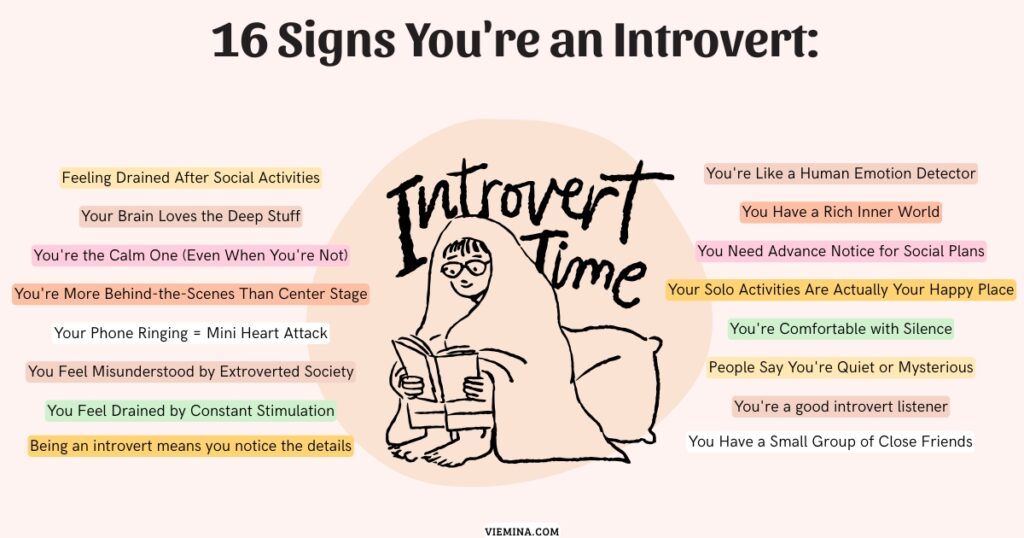
Recognizing introverted characteristics in yourself can be transformative. Here are the key indicators that suggest you might be more introverted than you initially thought( or maybe someone you know):
1-Feeling Drained After Social Activities:
You enjoy hanging out with people you care about. But there’s something about social interactions that just drains your energy tank, even when you’re having fun. Those big parties, networking events , or even really long heart-to-heart conversations can leave you feeling like you’ve run a marathon… mentally and emotionally.
It’s not that you don’t like people – it’s just that being “on” around others takes effort, and eventually you need to retreat somewhere quiet to get your brain back to normal. Think of it like your phone battery – it works great all day, but eventually it needs to be plugged in and left alone to charge back up.
That is what many introverts describe as a “social battery” that gradually depletes during social interactions. After spending time in social settings, they need alone time to recharge, unlike extroverts who gain energy from being around others.
This is personally how i feel, i like talking with my friends, family even stranger, getting into deep conversation but time to time i feel totally drained and needing to recharge again.
2-You Have a Few Close Friends Rather Than Many Acquaintances:
Here's another thing people get wrong about introverts – we're not antisocial, we're just picky about our people. Quality Over Quantity ,There's a difference!
Instead of having 50 casual friends, you probably have like 2-5 people you’re actually close to.
You’d rather have one really good friend who gets you than a bunch of surface-level friendships that require constant maintenance. It’s not that you can’t be friendly with lots of people – it’s just that your energy is better spent on relationships that actually matter to you.
Related: How To Avoid Fake Friends? 11 Warning Signs
Related: How To Maintain Lasting and Strong Friendships: 10 Tips
3-You’re the Calm One (Even When You’re Not)
People probably think you’re super chill and have everything together, right? Even when things get crazy, you seem like the steady one who doesn’t panic. But here’s the thing – you might be freaking out just as much as everyone else on the inside.
The difference is that you process all those messy emotions internally instead of letting them spill out immediately. While others are venting or reacting right away, you’re taking it all in and working through it in your head first. It’s not that you’re actually calmer – you’re just doing your emotional processing behind the scenes.
4-You’re More Behind-the-Scenes Than Center Stage:
You’re way more comfortable being the person who supports from the sidelines or contributes in ways that don’t involve having everyone’s eyes on you. It’s not about lacking confidence – it’s just that being the center of attention feels draining and unnecessary when you can make just as much impact without all the fanfare.
Related: How to Speak Well in 15 Easy Steps ?
Related: 15 Ways to Overcome Stage Fright and Build Confidence
5-You’re Like a Human Emotion Detector:
You’ve probably noticed this about yourself – you pick up on stuff that other people completely miss. Someone’s having a bad day? You can tell from the way they’re holding their shoulders. Your friend is excited about something but trying to play it cool? You see right through it.
You’re basically walking around with this emotional radar that picks up on all the subtle cues – the micro-expressions, the body language, the tone shifts that fly right over everyone else’s heads. It’s like you’re tuned into this frequency that most people don’t even know exists.
And honestly? This makes you an amazing friend. People probably come to you when they need someone who actually gets what they’re going through, because you don’t just hear what they’re saying – you feel what they’re feeling.
Related: How to Be More Attractive? 10 Rules To Boost Your Charisma
Related: Magnetic Personality: 8 Traits and How to Develop Them
6-You Need Advance Notice for Social Plans:
“Hey, wanna grab drinks right now? or you wanna do some shopping together” Ugh, does that text make your stomach drop a little? You’re not being antisocial – you just need time to mentally gear up for social stuff.
While your extroverted friends get pumped about spontaneous plans, you’re over here like “Wait, I need to check my energy levels and mentally prepare for this.” You’d rather know about social events ahead of time so you can make sure you’re in the right headspace and have enough juice in your social battery.
Last-minute invitations can feel more stressful than exciting, and that’s completely normal for you. It’s not that you don’t want to hang out – you just function better when you can plan for it instead of being caught off guard.
That’s what I always tell my friends—even my family: Please let me know about any plans in advance. Even just two hours ahead is better than surprising me, because surprises stress me out and I might end up canceling.”
7-Your Solo Activities Are Actually Your Happy Place:
Reading a book with zero interruptions? Binge-watching a show by yourself? doing a calm session of meditation or observation,That’s your therapy. Working on a creative project while everyone else is out at happy hour? You’re living your best life.( personally, this is my best time ever- my heaven).
You genuinely get energized by doing things alone, and you don’t need a crowd around to feel like you’re having a good time. In fact, you probably do your best thinking and most creative work when it’s just you and your thoughts.
Related: 20 Fun Things To Do Alone At Home
Related:10 Things That Happen When You Start to Enjoy Being Alone
8-You’re Comfortable with Silence:
While others rush to fill quiet moments with conversation, you’re perfectly content with comfortable silence. You don’t feel the need to constantly talk or be entertained by others, finding peace in quiet moments and internal reflection.
9-Your Phone Ringing = Mini Heart Attack:
Honestly – when my phone actually rings (not just buzzing with a text), I get that little spike of panic! What about you!
Phone calls can feel so demanding and intrusive, like someone’s forcing you to drop everything and be “on” right now.
Texting is way better because you can actually think about what you want to say before you say it. You get to process the conversation, craft a thoughtful response, and not worry about those awkward pauses or feeling pressured to respond instantly. It’s like having a conversation with training wheels – much more your speed.
10-Your Brain Loves the Deep Stuff:
You’re probably drawn to activities that actually make you think – writing, art, music, getting lost in a good book, or solving complex problems. While others need constant external stimulation, you get your kicks from pursuits that let you dive deep and use your brain in meaningful ways.
11-You Feel Drained by Constant Stimulation:
Open offices, busy restaurants, or anywhere with tons of noise and activity going on can feel like sensory torture. Your brain is basically like “NOPE, this is too much” and you find yourself desperately seeking quieter spaces just to think straight.
You’re not being dramatic – you literally need breaks from high-stimulation environments to keep your focus and energy intact. While others thrive in the chaos, you’re over here trying to find the nearest quiet corner to reset your overwhelmed brain.
12-You Have a Rich Inner World:
Your brain is basically always on – thinking, analyzing, daydreaming, coming up with random ideas, or replaying conversations from three days ago or more. While other people might need external entertainment to keep busy, you’ve got this whole rich inner world going on that never gets boring.
You probably have a pretty vivid imagination and spend a lot of time in your own head, which is actually where your best creativity and problem-solving happens. It’s like having your own personal think tank that’s always open for business.
13-Being an introvert means you notice the details:
You know how sometimes you’ll be in a group and you notice someone looks uncomfortable, but everyone else is just chatting away like nothing’s wrong? That’s you picking up on the subtle stuff that others completely miss.
You catch inconsistencies in stories, remember specific details from conversations weeks later, or notice when something just feels “off” about a situation. Your brain processes things so deeply that you naturally spot patterns and little details that most people zoom right past without a second thought.
14-You’re a good introvert listener:
People probably always end up telling you their problems, right? That’s because you’re naturally a really good listener. While others are just waiting for their turn to speak, you’re actually paying attention to what someone is saying and how they’re feeling.
You don’t just hear the words – you pick up on the emotions behind them. You ask thoughtful questions, remember what people tell you, and somehow make them feel heard in a way that’s pretty rare these days. It’s no wonder people seek you out when they need someone who actually gets it.
15-People Say You’re Quiet or Mysterious:
This is one of the common signs of an introvert—You’ve probably heard this one your whole life, right? “You’re so quiet” or “You’re hard to read.” People act like you’re some kind of mystery novel they can’t figure out, but honestly? You’re just thinking. A lot.
While everyone else is talking, you’re processing what’s being said, considering different angles, or maybe just enjoying the silence. It’s not that you’re trying to be mysterious – you just don’t feel the need to fill every moment with words. But apparently that makes you “enigmatic” or whatever. Sometimes it feels like being quiet is treated like a personality flaw, when really it’s just how you operate.
Related: Magnetic Personality: 8 Traits and How to Develop Them
Related: 23 Signs you have an Endearing Personality
16-You Feel Misunderstood by Extroverted Society;
You know that feeling when you’re an introvert and it seems like the whole world is built for extroverts? With all the networking events, open offices, and constant team collaboration – it’s honestly exhausting.
The worst part is trying to explain why you need alone time without people thinking you’re being antisocial. What energizes them – all that socializing and chatting – literally drains your battery. You’re not weird, you just recharge differently!
Why Understanding These Signs Matters:
Understanding the signs of introverts isn’t just about identification – it’s about appreciating the unique strengths this personality trait brings:
- Deep thinking and analysis.
- Authentic connections with others.
- Creative problem-solving.
- Empathetic listening.
- Independent motivation.
In a society that sometimes undervalues introversion, recognizing these qualities helps create more inclusive environments where introverts can thrive and contribute their valuable perspectives.
Whether you’re an introvert yourself or someone hoping to better understand the introverts in your life, recognizing these signs opens the door to greater appreciation for the quiet strength that defines this personality type.
Common Misconceptions About Introverts:
Let’s clear up a few things that might be misunderstood:
Myth: Introverts are just shy and avoid people
Reality: Not true. Being introverted is not the same as being afraid of others or having poor social skills. It’s about how they handle and preserve their energy. Introverts can be super confident, great at connecting with others, and even charming. They just often need some alone time afterward to recharge and reflect.
Myth: Introverts dislike people
Truth: Many introverts care about others but often choose smaller personal interactions instead of big group settings. They’d rather dive into one deep conversation than spend time jumping between shallow chats with a bunch of people. It’s about valuing depth over numbers.
Myth: Introverts can’t lead.
Reality: Plenty of accomplished leaders are introverts. They rely on their ability to think , listen , and make well-considered choices in their roles.
Myth: Introverts must act more extroverted to succeed.
Reality: This idea might be the most harmful of all. The best introverts don’t fake extroversion. They focus on using their unique talents. Why try to act like someone else when being yourself does the job well?
Can You Be a “Social Introvert”?
Absolutely! Introversion exists on a spectrum, and many people fall somewhere in the middle called ambiverts. You might be a social introvert if you:
- Enjoy social activities but need recovery time afterward.
- Can be outgoing in comfortable settings but reserved in new environments.
- Have periods of wanting lots of social interaction followed by periods of preferring solitude.
- Feel energized by certain types of social activities but drained by others.
Remember, personality traits aren’t rigid categories—they’re fluid patterns that can vary based on context, mood, and life circumstances.
What are the 4 types of introverts?
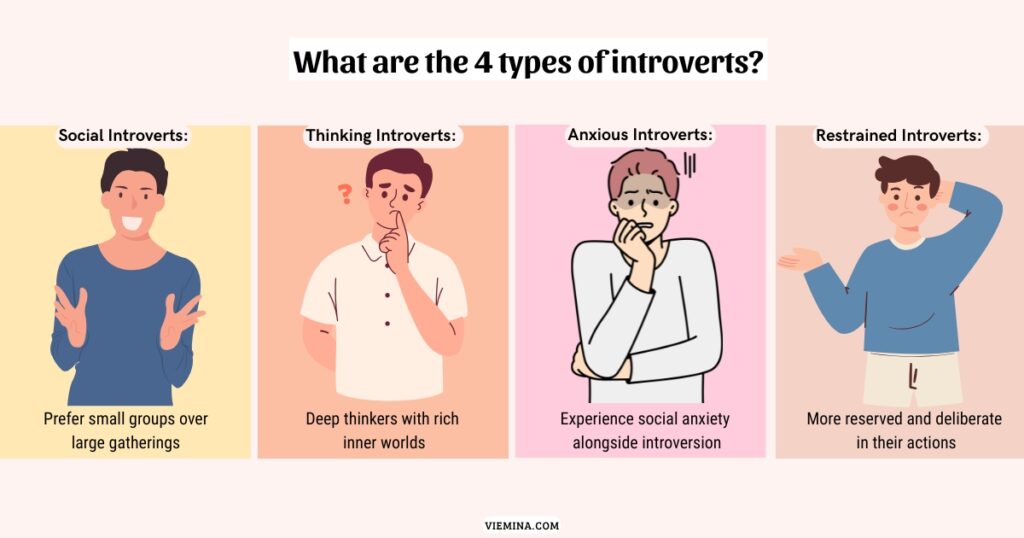
Research has revealed that introversion isn’t a one-size-fits-all trait. Psychologists developed the STAR model, identifying four distinct types of introverts: Social, Thinking, Anxious, and Restrained. Understanding these types can help you better recognize your own introversion patterns.
1-Social Introverts:
Social introverts feel more at ease in small groups or one-on-one conversations than in big crowds. They’re not necessarily shy—they simply find smaller, more intimate social settings more comfortable and energizing. You might be a social introvert if you enjoy deep conversations with close friends but feel drained by parties or networking events.
2-Thinking Introverts:
Thinking introverts are daydreamers and deep thinkers. They have rich inner worlds and spend considerable time in introspection and self-reflection. These introverts might appear lost in thought, enjoy creative pursuits, and prefer to process information internally before sharing their ideas.
3-Anxious Introverts:
Anxious introverts experience introversion alongside social anxiety. They might avoid social situations not just because they’re draining, but because they feel nervous or uncomfortable around others. This type often involves overthinking social interactions and feeling self-conscious in group settings.
4-Restrained Introverts:
Restrained introverts (also called inhibited introverts) are more reserved and deliberate in their actions. They think before they speak, take time to warm up in new situations, and prefer familiar routines. They’re not impulsive and tend to be more cautious in their approach to new experiences.
Remember, most people aren’t purely one type—you might be a combination of different introvert types depending on the situation and your mood.
What Causes Introversion?
Understanding what shapes introversion can help you better accept and work with your natural tendencies. The answer involves both nature and nurture:
1-Genetic Factors:
Research shows that introversion and extraversion are largely rooted in your genes, meaning if your parents are introverted, you’re more likely to be introverted as well. Studies indicate that introversion is about 50% heritable, with half of the differences between extraverted and introverted personalities being due to genetic differences.
Key genetic influences include:
- Brain chemistry differences: Introverts may be more sensitive to dopamine and have different arousal thresholds.
- Nervous system sensitivity: Some people are born with more sensitive nervous systems that respond more strongly to stimulation.
- Neurotransmitter processing: Genetic variations affect how your brain processes stimulation and rewards
Related: Can your blood group determine your personality? A genetic insight into introversion
2-Environmental Factors:
While genetics play a significant role, but your environment also shapes how your introversion shows up:
- Childhood experiences: Early social experiences and parenting styles can shape how comfortable you become with social interaction.
- Cultural influences: Some cultures value quiet reflection more than others, affecting how introversion is expressed.
- Life experiences: Traumatic or positive social experiences can influence your comfort level with social situations.
Related: 23 Signs of Repressed Childhood Trauma in Adults
Related: Trauma
3-The Interaction of Nature and Nurture:
Your genes give you a certain range when it comes to introversion. If that range is wide, your upbringing can shape how social or introverted you turn out. But if it’s narrow, no matter how you’re raised, your core nature probably won’t change much.
This means that while you’re born with certain tendencies, your environment and experiences help shape how those tendencies are expressed in your daily life.
Lessons from Famous Introverts:
History shows us that many introverts have made a big difference by leaning into their quiet nature instead of changing who they are.
Their stories provide valuable lessons for modern introverts navigating career and personal challenges.
1-Albert Einstein: The Power of Solitary Thinking
Einstein credited his greatest discoveries to long periods of solitary contemplation. His approach to complex problems involved deep, uninterrupted thinking sessions that allowed him to make connections others missed.
Key Lesson: Protect your thinking time. Your best ideas and solutions often emerge during quiet reflection, not in brainstorming sessions or busy environments.
2-Eleanor Roosevelt: From Solitude to Service
Despite describing herself as painfully shy in her youth, Roosevelt became one of history’s most influential advocates for human rights. Her early periods of solitude and self-reflection developed the empathy and conviction that later drove her public service.
Key Lesson: Your introversion can be a source of strength for helping others. Deep self-understanding often translates into better understanding of human nature and social issues.
3-Emma Watson: Authentic Self-Acceptance
Watson has spoken candidly about being introverted in Hollywood, an industry that often rewards extroversion. She’s built a successful career by choosing projects that align with her values and finding ways to use her platform that feel authentic to her personality.
Key Lesson: Success means defining achievement on your own terms. You don’t need to conform to external expectations of how successful people should behave.
4-J.K. Rowling: Creativity Through Solitude
Rowling wrote much of the Harry Potter series in quiet cafes and during long periods of solitary work. Her introversion provided the sustained focus necessary for creating complex, detailed fictional worlds.
Key Lesson: Your need for solitude isn’t selfish—it’s where your most valuable contributions are often born. Protect and prioritize your creative time.”
Related: Famous Introverts and What You Can Learn From Them
Conclusion:
Understanding the signs of an introvert is more than an academic exercise—it’s a pathway to self-acceptance, authentic living, and maximizing your unique contributions to the world. Whether you’ve recognized yourself in every characteristic or just a few, the key insight remains the same: introversion is not a limitation to overcome but a strength to understand and leverage.
As you move forward, remember that thriving as an introvert isn’t about learning to act like an extrovert—it’s about learning to be exceptionally good at being yourself. It’s about managing your energy wisely, communicating your needs clearly, and contributing your unique gifts confidently.
So, What’s Your Experience?
Which of these signs of introverts resonated most strongly with you? Share your favorite introverted strength or a tip for thriving in the comments below—your insights might be exactly what another introvert needs to hear today.
Frequently Asked Questions About Introverts
Q: Are introverts just shy people?
A: No. Shyness is social anxiety, while introversion is about energy management. Many introverts are confident and socially skilled—they just prefer smaller groups and need alone time to recharge.
Q: Do introverts hate people?
A: Not at all. Introverts often love people deeply but prefer meaningful connections over small talk and large group interactions.
Q: Can introverts be good leaders?
A: Yes! Many successful leaders are introverts. They excel at listening, thoughtful decision-making, and building deep relationships with team members.
Q: Are introverts more intelligent?
A:Research shows that on average, introverts and extroverts have similar levels of intelligence. However, statistics suggest that around 70% of gifted individuals are introverts. Intelligence isn’t determined by personality type—both introverts and extroverts can be highly intelligent in different ways.
Q: Do introverts dislike parties?
A: It depends on the event and the introvert. Many introverts enjoy social gatherings, especially smaller ones with close friends. The key difference is that introverts typically need recovery time after social events, regardless of whether they enjoyed them or not.
Q: Are introverts boring?
A: Definitely not! Get an introvert talking about their passions, and they can be incredibly engaging. They often have rich inner worlds and fascinating perspectives.
Q: Can introverts become extroverts?
A: Your core personality is largely stable, but you can develop social skills and adapt to different situations while staying true to your introverted nature.
Q: Do introverts always want to be alone?
A: No, they need balance. Introverts require solitude to recharge, but they also value and seek meaningful connections with others.
A: Not at all. Introverts may appear reserved initially, but once comfortable, they can be warm, engaging, and deeply caring friends.
Q: Is it harder for introverts to be happy?
A: No, introverts and extroverts just find happiness in different ways. Introverts often find deep satisfaction in quiet activities and meaningful relationships.

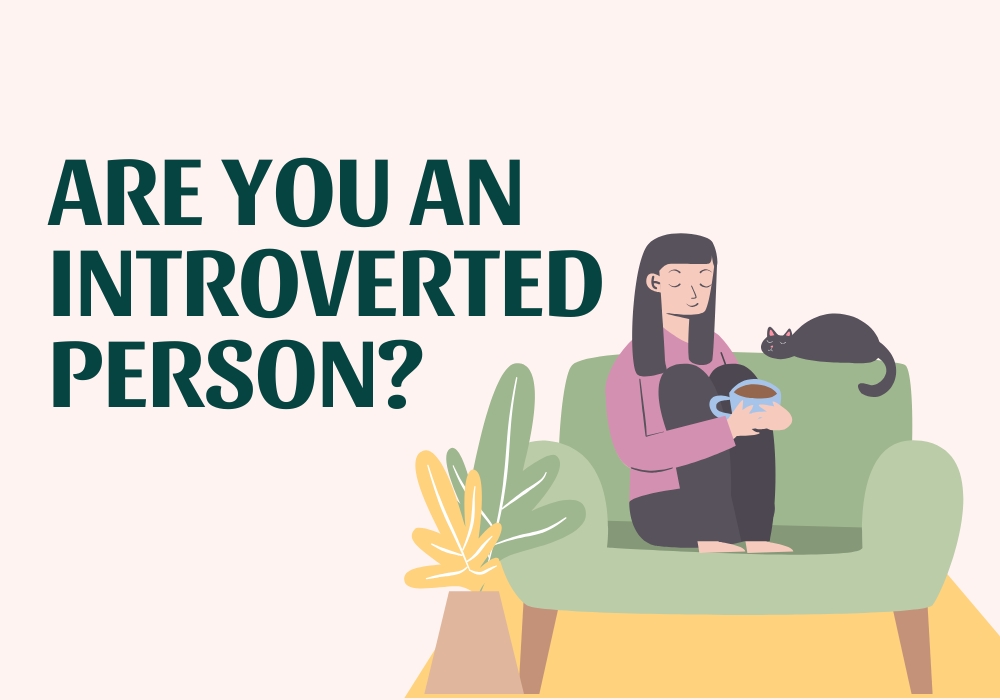
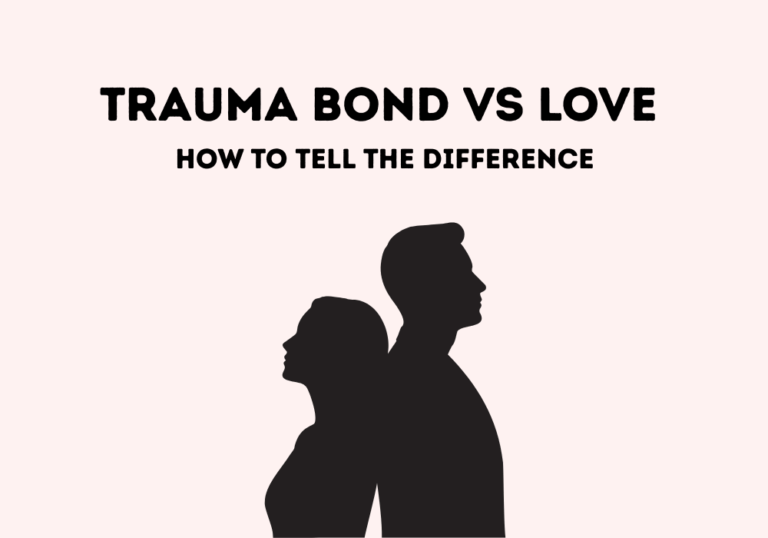
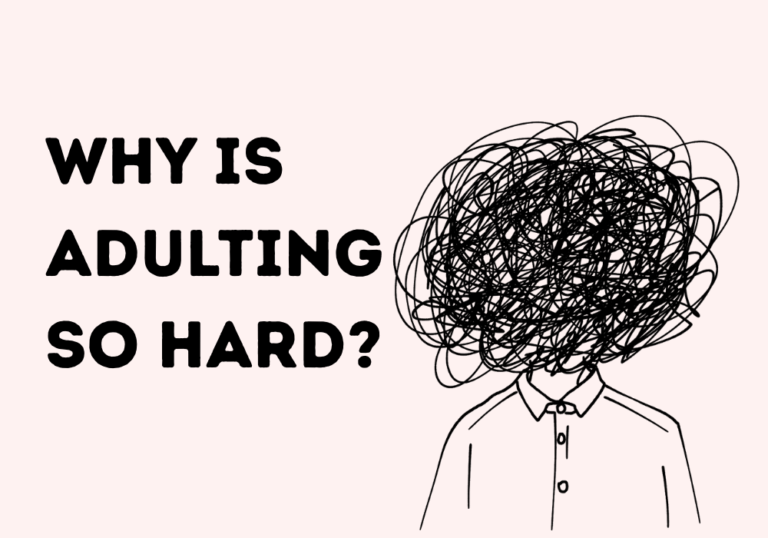
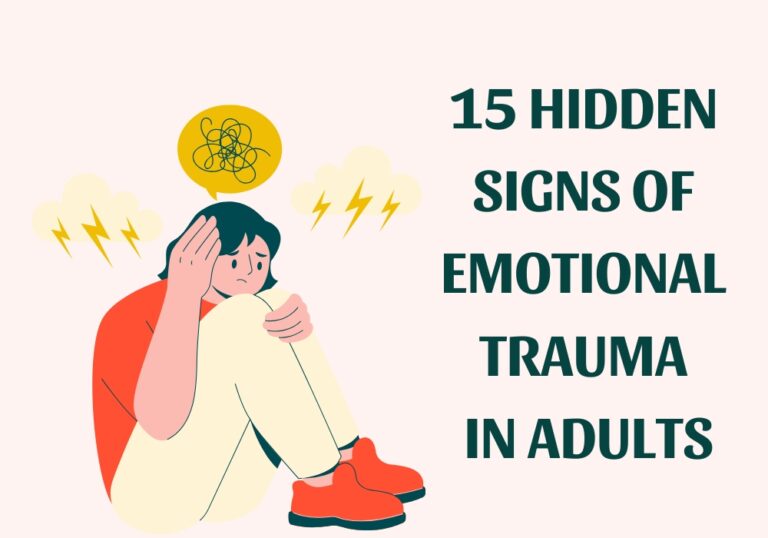




i’m an introvert person, and i’m proud LOL
Thank you for this informative post
Thank you so much for your supportive comment! ❤❤